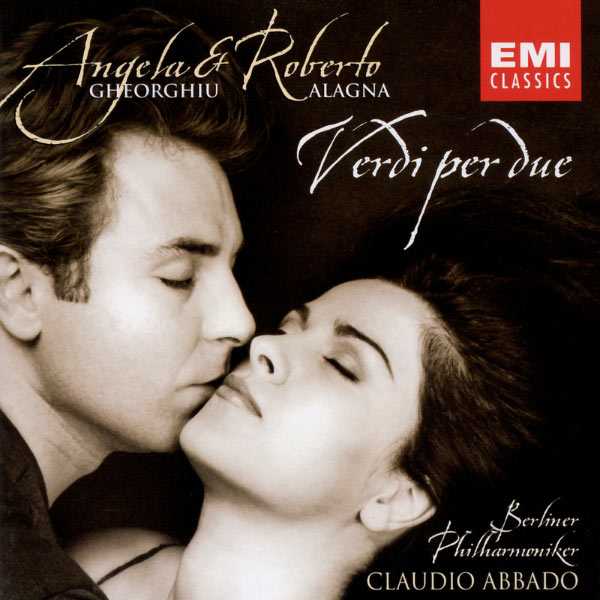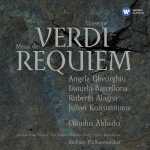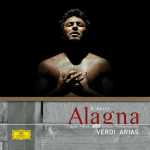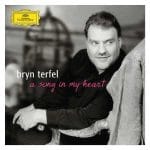
Composer: Giuseppe Verdi
Performer: Roberto Alagna, Angela Gheorghiu, London Voices
Orchestra: Berliner Philharmoniker
Conductor: Claudio Abbado
Format: FLAC (tracks)
Label: EMI
Catalogue: 5567172
Release: 1998
Size: 270 MB
Recovery: +3%
Scan: cover
01. Don Carlo, Act 5: “È dessa! … Un detto, un sol” (Don Carlo, Elisabetta)
02. Don Carlo, Act 4: “Ma lassù ci vedremo” (Elisabetta, Don Carlo)
03. I Lombardi alla prima crociata, Act 3: “Oh belle, a questa misera” (Giselda, Oronte)
04. I Lombardi alla prima crociata, Act 3: “All’armi! Che ascolto!” (Coro, Oronte, Giselda)
05. Simon Boccanegra, Act 1: “Cielo di stelle orbato” (Gabriele, Amelia)
06. Simon Boccanegra, Act 1: “Vieni a mirar a cerula” (Amelia, Gabriele)
07. Otello, Act 1: “Già nella notte densa” – “Mio superbo guerrier!” – “Venga la morte!” (Otello, Desdemona)
08. I vespri siciliani, Act 4: “Pensando a me!” – “Or dolce all’anima” (Arrigo, Elena)
09. Rigoletto, Act 1: “Giovanna, ho dei rimorsi” – “Signor né principe” (Gilda, Giovanna, Duca)
10. Rigoletto, Act 1: “È il sol dell’anima” (Duca, Gilda)
11. Rigoletto, Act 1: “Che m’ami, deh ripetimi” (Duca, Gilda, Ceprano, Borsa, Giovanna)
12. Rigoletto, Act 1: “Addio! speranza ed anima” (Gilda, Duca)
13. Aida, Act 4: “La fatal pietra sovra me si chiuse” (Radames, Aida, Coro)
14. Aida, Act 4: “O terra, addio, valle di pianti” (Aida, Radames, Amneris, Coro)
15. I masnadieri, Act 3: “Qual mare, qual terra da me t’ha diviso?” (Amalia, Carlo)
16. I masnadieri, Act 3: “Qui nel bosco? Solinga? Smarrita?” (Carlo, Amalia)
17. I masnadieri, Act 3: “Lassù risplendere più lieta e bella” (Amalia, Carlo)
18. Il trovatore, Act 4: “Miserere d’un’alma già vicina” – “Quel suon, quelle preci solenni” (Coro, Leonora, Manrico)
19. La traviata, Act 1: “Libiamo ne’ lieti calici” (Alfredo, Violetta, Coro)
This long, fascinating, highly ambitious recital is nothing less than a conspectus of Verdi’s soprano-tenor duets, and is executed with distinction on all sides. Gheorghiu deserves particular plaudits. It seems that nothing in Verdi (and indeed in much else) is beyond her capabilities. Her singing here, especially as Gilda, Aida and Desdemona, is so exquisite, the tone so warm and limpid, the phrasing so shapely as surely to melt any heart. Take, for example, Gilda’s touching exchanges with Giovanna, herself sung by the superb mezzo Sara Mingardo, the whole of Aida’s solo beginning ‘Presago il core’, with the soprano’s warm lower register coming into play and that ultimate test, Desdemona’s poised ‘Amen’. Throughout, both musically and interpretatively, she simply can’t be faulted.
Neither she nor her husband is backward in coming forward with less hackneyed pieces, those from the early operas – try the section starting ‘Ma un’ iri di pace’ in the Masnadieri duet, the two voices in ideal blend, phrases and tone sweetly shaded with the following cabaletta all light eagerness on both sides. Then there’s plangent singing on both sides in the sad little piece from Vespri, though it’s a pity they did not attempt this in the original French. Here and throughout Alagna is his customary self, assured (a few over-pressed high notes, some unwritten, apart), impassioned, thoughtful and accurate in his phraseology, nowhere more so than in the parts he’s unlikely as yet to take on stage – Radames and Otello. Even more important in so many passages, Alagna finds the right mezzopiano, where heavier tenors have to sing forte , notably in the closing phrases where Otello wafts his love of Desdemona on to the night air – a moment of sheer magic.
Abbado and the Berlin Philharmonic Orchestra are at their peak of achievement and the recording catches these voices in their full glory, making this a most desirable issue.



